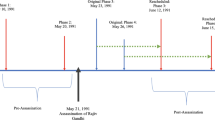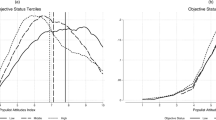Abstract
Over the past decade, the proliferation of election surveys has worked to undergird the electoral system in Mexico and to make electoral fraud more difficult. In the presidential elections of 1994, significant controversies arose as to survey methodologies, but by the congressional elections of 1997 the fierce debates over methodologies had subsided. Substantively, the surveys confirm the accuracy of the vote count in 1998, allow profiles of voters to be constructed for the three most important parties and mark declines in the support of the once dominant Partido Revolucionario Institucional.
Similar content being viewed by others
Bibliography
ABUNDIS LUNA, FRANCISCO, et al. 1994Decisíon ciudadana 1994: Reglas del juego, candidatos y perspectivas. México: Rayuela Editores.
ALMOND, GABRIEL A, and SIDNEY VERBA 1965The civic culture: Political attitudes and democracy in five nations. Boston: Little, Brown and Company.
BÁEZ RODRÍGUEZ, FRANCISCO 1995 Encuestas y conteos de las elecciones de 1994. In Vol. 2 ofElecciones, diálogo y reforma, México, 1994, edited by Jorge Alcocer V., 2 vols. México: Nuevo Horizonte Editores, Centro de Estudios para un Proyecto Nacional.
BAILEY, JOHN, AND ARTURO VALENZUELA 1997 The shape of the future.Journal of Democracy, 8: 43–57.
BASÁÑEZ, MIGUEL 1995 Problems in interpreting electoral polls in authoritarian countries: Lessons from the 1994 Mexican election.International Social Science Journal, 146: 643–50.
— 1996 Polling and the 1994 election results. InPolling for democracy: Public opinion and political liberalization in Mexico, edited by Roderic Ai Camp. Wilmington: SR Books.
BELDEN, NANCY 1994 Las encuestas de opinión de 1994: Política y metodología.Este País, 45 20–2.
BELTRÁN, ULISES 1994 Los encuestados y votantes de agosto. InElecciones a debate, 1994: Testimonio juicio de los observadores: Los resultados finales, edited by Germán Pérez del Castillo. México: Ediotrial Diana.
BOOTH, JOHN A., AND MITCHELL A. SELIGSON 1984 The political culture of authoritarianism in Mexico: A reexamination.Latin American Research Review, 19: 106–24.
BUENDÍA LAREDO, JORGE 1995 Economics, presidential approval, and party in Mexico: The 1994 elections. Paper presented at the meeting of the Latin American Studies Association, 28–30 September, Washington, D.C.
CALDERÓN ALZATI, ENRIQUE, AND DANIEL CAZÉS, 1996Las elecciones presidenciales de 1994. México: La Jornada Ediciones and the Centro de Investigaciones Interdisciplinarias en Ciencias y Humanidades, universidad Nacional Autónoma de México.
CORNELIUS, WAYNE A. 1995 Repercusiones de los comicios de 1994 en la transición gradual de México hacia la democracia. InLa voz y los volos: Un análisis crítico de las elecciones de 1994, edited by Germán Pérez Fernández del Castillo, Arturo Alvarado M., and Arturo Sánchez Gutiérrez. México: FLACSO, Sede México, Miguel Angel Porrúa Grupo Editorial.
CRESPO, JOSÉ ANTONIO. 1995Urnas de Pandora: Parlidos politicos y elecciones en el gobierno de Salinas. México: Espasa Calpe.
DILLON, SAM 1998, A new optimism on ending graft in Mexico City.the New York Times, 12 February.
DOMÍNGUEZ, JORGE I., AND JAMES A. McCANN 1994 Whither the PRI? Explaining voter defection in the 1988 Mexican presidential elections. InParties, elections, and political participation in Latin America edited by Jorge I. Domínguez. New York: Garland Publishing.
— 1996Democratizing Mexico: Public opinion and electoral choices. Baltimore: The Johns Hopkins University Press.
FOWERAKER, JOE, AND TODD LANDMAN 1995 The August 1994 elections in México:Electoral Studies, 14-199-203.
GRAYSON, GEORGE W. 1994A guide to the 1994 Mexican presidential election: An election studies report of the CSIS Americas Program, Mexico Project. Washington, D.C.: Center for Strategic & International Studies.
HUCHIM, EDUARDO R. 1995Engaño mayor: La campaña, la elección, la devaluación, y la guerra. México: Grijalbo.
LAWSON, CHAPPELL 1997 The elections of 1997.Journal of Democracy, 8: 13–27.
LINZ, JUAN J. 1998 Democracy’s time constraints.International Political Science Review, 19: 19–37.
LIPSET, SEYMOUR MARTIN 1963, 1981Political man: The social bases of politics. Baltimore: Johns Hopkins.
— 1998Democracy in Europe and the Americas. Washington, D.C.: Congressional Quarterly Inc.
MERCADO GASCA, LAURO IGNACIO 1993 Estudio del votante mexicano por medio de las encuestas a la salida de las casillas. Licenciatura thesis. El Colegio de México.
— 1997 Una visita a la lealtad hacia los partidos políticos en América Latina.Política y Gobierno, 4: 285–346.
MOLINAR HORCASITAS, JUAN 1991El tiempo de la legitimidad: Elecciones, autoritarismo y democracia en México. México: Cal y Arena.
MONCAYO, PABLO PASCUAL, ed. 1995Las elecciones de 1994 México: Cal y Arena.
MORALES PAULÍN, CARLOS A. 1997Reforma al sistema electoral mexicano. México: Plaza y Valdés.
RODRÍGUEZ, VICTORIA E. 1998 Opening the electoral space in Mexico: The rise of the opposition at the state and local levels. InUrban elections in democratic Latin America, edited by Henry A. Dietz and Gil Shidlo. Wilmington: SR Books.
RODRÍGUEZ, VICTORIA E. AND, PETER M. WARD 1995 Introduction: Governments of the opposition in Mexico. InOpposition government in Mexico, edited by Victoria E. Rodríguez and Peter M. Ward. Albuquerque: University of New Mexico Press.
SARTORI, GIOVANNI 1997 Ni presidencialismo ni parlamentarismo. InLas crisis del presidencialismo 1. Perspectivas comparativas, edited by Juan J. Linz and Arturo Valenzuela. Madrid: Alianza Editorial, S.A.
SCOTT, ROBERT E. 1965 Mexico: The established revolution. InPolitical culture and political development, edited by Lucian W. Pye and Sidney Verba. Princeton: Princeton University Press.
SOLIS CÁMARA, FERNANDO 1994 Encuestas, procesos electorales y camaños políticas.In México: El voto pro la democracia, edited by Antonio Argüelles y Manuel Villa, México: Los Libros de Textos para el Cambio.
TOLEDO LAGUARDIA, ROSARIO, AND RICARDO DE LA PEÑA 1994 Elementos empíricos para el análisis de las pautas regionales de la cultura política y la opinión publíca en México. InPartidos, elecciones y cultura política en México: Los espacios de la democracia en la sociedad mexicana contemporánea, edited by Juan Reyes del Campillo, Eduardo Sandoval Forero, and Mario Alejandro Carrillo. México: Universidad Autónomia del Estado de México, Facultad de Ciencias Políticas y Administración Pública, Universidad Autónoma Metropolitana Xochimilco, COMECSO.
TURNER, FREDERICK C. 1994 La validez de las encuestas.Este País, 45: 12–18.
TURNER, FREDERICK C. 1973 Mexican politics: The direction of development.In Críticas constructivas del sistema politico mexicano, edited by William P. Glade and Stanley R. Ross. Austin Institute of Latin American Studies, the University of Texas at Austin.
Additional information
Seymour Martin Lipset is Hazel Chair of Public Policy in the Public Policy Institute, George Mason University, 4400 University Drive, MSN 3C6 Fairfax, VA 22030, United States of America. Robert M. Worcester is the Chairman of MORI International, 32 Old Queen Street, London SW1H 9HP, United Kingdom.
Frederick C. Turner is Professor de Ciencia Política at the Universidad de San Andrés, Victoria, Argentina, and Vice President of the International Social Science Council in Paris. Address correspondence to: Carrera de Ciencia Política, Universidad de San Andrés, Vito Dumas 284 esq. Arias, (1644) Victoria Provincia de Buenos Aires, Argentina.
The authors, as past presidents of the World Association for Public Opinion Research (WAPOR), visited Mexico, as guests of the newspaperExcelsior, during the weeks prior to the general elections of August, 1994. They would like to thank Francisco Abundis Luna, Miguel Basáñez, Jorge Buendía Laredo, Carlos A. Elordi, Rafael Giménez, Lauro Mercado Gasca, and two anonymous readers for thoughtful comments on earlier drafts of this article.
Rights and permissions
About this article
Cite this article
Lipset, S.M., Worcester, R.M. & Turner, F.C. Opening the Mexican political system: Public opinion and the elections of 1994 and 1997. St Comp Int Dev 33, 70–89 (1998). https://doi.org/10.1007/BF02687492
Issue Date:
DOI: https://doi.org/10.1007/BF02687492




